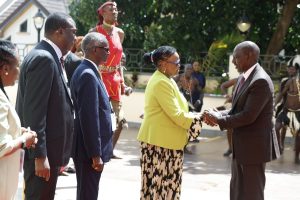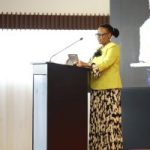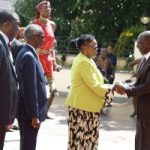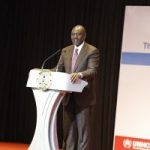Uphold fairness, courage, and independence in decisions. President Ruto tells judges

November 17, 2025 | Nairobi, Kenya | Uphold fairness, courage, and independence in decisions, President Ruto tells judges
President William Samoei Ruto has urged judges to continue upholding fairness, courage, and independence in their decisions saying that where courts are free from political interference, they serve as safeguards against arbitrary action.
Speaking when he officially opened the 14th International Association of Refugee and Migration Judges (IARMJ) World Conference in Nairobi, the President observed that judges ensure that asylum procedures are credible, transparent, and just; and that justice is not only done, but seen to be done adding that this, in turn, fosters public confidence.
“Your obligation as judges is the solemn duty of ensuring that every refugee and migrant who comes before you finds justice, fairness, and the reassurance that their case has been heard with dignity and integrity. Always remember that the decisions you make reverberate far beyond the courtroom; they shape lives, preserve families, and safeguard the credibility of the international protection regime.”He said.
Noting that judges also played a vital role in harmonising the interpretation of refugee law across jurisdictions, President Ruto called on them to ensure that claims are heard fairly and that states uphold their obligations under both domestic and international law.
“Through cooperation and knowledge-sharing, judges can develop a consistent global jurisprudence that ensures fairness no matter where a claim is heard. Justice must not depend on geography or chance,”he stated.
Also speaking at the conference that brings together judges, jurists, development partners and international organisations from across the globe, Chief Justice Martha Koome underscored the centrality of fair, credible, transparent and humane refugee and migration systems which she argued, millions of people rely on for their safety and dignity.
The CJ emphasized that integrity of the Refugee and Migration systems is the foundation upon which the safety, dignity, and rights of refugees, migrants and host communities depend.
She expressed the need to have asylum and migration processes that are fair, credible and well managed saying that systems that function as intended protect those genuinely in need and are not undermined by abuse or politicisation.
CJ Koome argued that systems weakened by backlogs, loopholes or inconsistent outcomes quickly lose public trust adding that closing legal gaps, upholding the independence of adjudicators, and ensuring objective decision-making are essential steps in preserving credibility.
Chief Justice Koome underscored the conference theme — Protecting the Integrity of the Refugee and Migration Systems — as a timely call to ensure that systems remain fair, credible, transparent and humane and expressed Kenya’s pride in co-hosting the global forum, emphasising the country’s long-standing commitment to refugee protection and judicial cooperation.
She noted that the conference comes at a time when global displacement has reached unprecedented levels, with over 120 million people uprooted worldwide. This, she said, has placed extraordinary pressure on refugee and migration governance systems and highlighted the essential role of the judiciary in safeguarding fairness, due process and human rights.
The CJ outlined the elements that uphold integrity in migration management, including impartial and accessible asylum procedures, credible and up-to-date legal frameworks, adequate resources, trauma-informed interviewing, reliable country-of-origin information and consistent decision-making. Further, she stressed that transparency, accountability and accurate communication are essential in combating misinformation and xenophobia.
Justice Koome cited the High Court of Kenya’s landmark Haki na Sheria judgment delivered on 17 July 2025, where the Court affirmed that children born in Kenya to mixed-nationality couples where one parent is Kenyan and the other a refugee are citizens by birth, as a defining example of the judiciary’s role in protecting vulnerable populations. The ruling struck down discriminatory practices that had effectively rendered many children stateless and reaffirmed the rights to dignity, family unity and equal treatment.
She noted that such jurisprudence demonstrates Kenya’s commitments under national and international law and reinforces the rule of law as the foundation of a credible and humane refugee protection regime.
Chief Justice Koome called attention to emerging pressures facing refugee and migration systems globally, including climate-induced displacement, human trafficking, migrant smuggling and the rapid expansion of artificial intelligence. She encouraged the development of principled approaches that address these challenges while safeguarding fairness, dignity and accountability. Technology, she said, must support not undermine the delivery of justice.
The CJ emphasised that no single country can address forced displacement or irregular migration alone. She called for stronger regional and international cooperation, judicial dialogue and shared standards, noting that networks such as the IARMJ play an essential role in strengthening jurisprudence and enhancing collective capacity.
“As judges, we are custodians of justice and human rights,” she stated. “By ensuring that laws are applied fairly and by protecting the vulnerable, we uphold the foundations of stable and democratic societies. Our vigilance is the hope of millions who seek safety and a better future.”
ENDS






